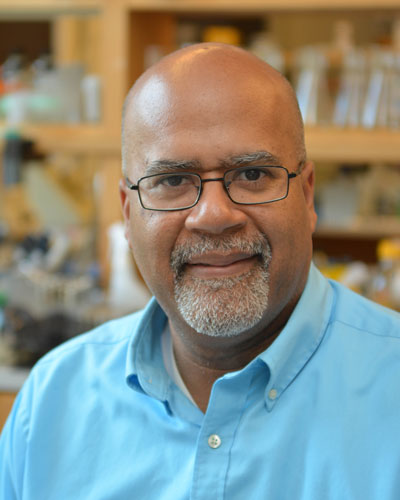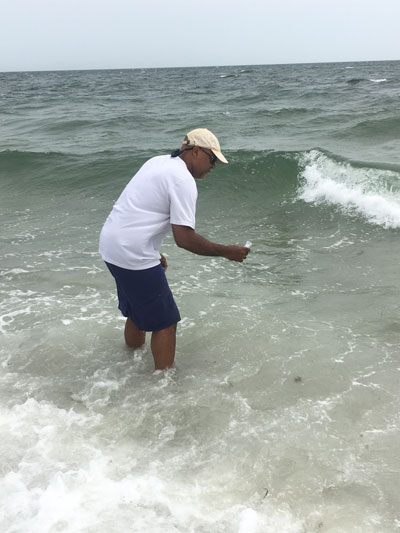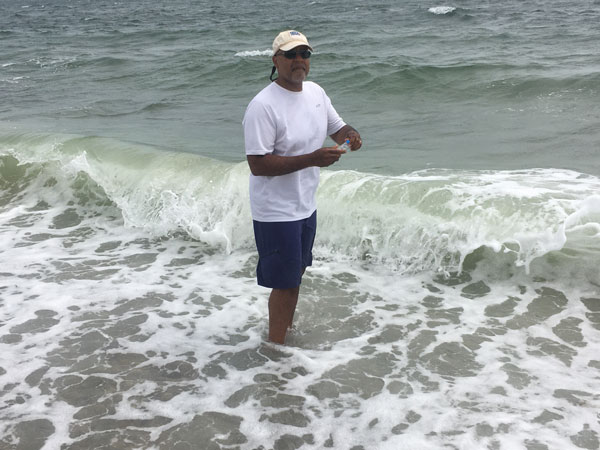"Take Five" with Virologist Paul E. Turner


"Take Five" is an occasional feature in which we pose five questions to an MBL community member about their career, dreams, and passions. Here we profile Paul E. Turner of Yale University/Yale School of Medicine, where he is the Rachel Carson Professor of Ecology and Evolutionary Biology.
Long before the novel coronavirus of 2019 raced around the globe, Paul Turner was fascinated with the extraordinary success of viruses. His lab at Yale University explores many aspects of virus ecology and evolution, including how viruses emerge, jump to new host species, and adapt to environmental challenges. On the medical side, Turner is interested in using viruses to treat antibiotic-resistant bacterial infections. With the advent of COVID-19, Turner’s lab took on new projects, including viral decontamination of medical protective gear (PPE); detection of the coronavirus in wastewater and in rivers; and exploring the susceptibility of marine mammals (such as whales) in zoos and aquaria to coronavirus infection, a collaboration with Mystic Aquarium in Mystic, Conn.
Turner’s long affiliation with the MBL includes serving on the faculty of the Molecular Evolution workshop (2003-10) and the Microbial Diversity course (2011-13, 2018-19) and ongoing collaborations with scientists in the Josephine Bay Paul Center. He was a Whitman Center scientist from 2011-15 and was the E.E. Just Fellow in 2011.
When and why did you decide to become a scientist?
I was the classic kid who’s interested in biology. Growing up in Oakland, Calif., and later in Syracuse, N.Y., I was fascinated by animal biodiversity that I saw on TV documentaries and in zoos, and I’d go looking around in natural areas to see if I could find critters. I went to University of Rochester as an undergraduate thinking I would be an engineer, but I found I needed to switch my major to biology instead. It was a childhood fascination that I never lost. The faculty there suggested I consider pursuing a Ph.D. and a job in academic science. I didn't know that was a possibility. My parents graduated from college and had careers but this was just not something we talked about. So that suggestion was very enlightening to me, and it took me down the path of science as a professional career.

What question most interests and inspires you to come to the lab for research?
I could summarize it as virus biodiversity and evolution. I'm amazed by the vast biodiversity of viruses, even though they are entirely dependent on hijacking a host cell in order to grow and replicate. To me, that is just fascinating, that the strategy of parasitism is dominant on this planet. There are an estimated 1031 particles of viruses on the planet at any one time, which exceeds the estimate of bacterial cells by about tenfold. There’s this whole lurking world of biodiversity that can’t be seen with the naked eye, and we're not even at the tip of the iceberg in figuring out its extent.
And it seems like it's a pretty tough thing to make it as a virus. They don’t have any control over where they go, so they can wander into the wrong environment and bombard with an incorrect cell type. And outside of cells, viruses can suffer from stressors like UV radiation or temperature that quickly degrade virus particles. So that really drives my curiosity. How can you account for the success of viruses? It’s an enduring mystery.
If you could invite three specialists in your field, living or deceased, to dinner, who would you choose and what would you talk about?
Charles Darwin is a bit of a no-brainer; any evolutionary biologist worth their salt would want to meet him someday. The depth of Darwin’s creativity in On the Origin of Species is amazing. He’s just covering a whole lot of ground, especially given the flimsy evidence at that time for understanding how biological systems work. Another person would be Rachel Carson. She is one of my scientific heroes for how brave she was to swim against the tide. She had an amazing career at the time when it was very tough — it still is tough — for female scientists. And yet she persevered; she had some amazingly impactful writing. And the third would be E.E. Just, who had a profoundly vital pioneering experience as one of the early African-American scientists. It would be an honor to meet him and talk about the profound struggles he faced as a professional; what he had to do just to be able to stay in science and education. He obviously suffered in terms of what he aspired to do versus what the system allowed him to do.
So what would we talk about? I'd love to know how these scientists might view the current challenges of communicating science to the lay public, and how interfacing with the public in their time compares to what we're dealing with now. Also, even though these people had different research training, there is the old adage from Theodosius Dobzhansky that nothing in biology makes sense except in the light of evolution. So perhaps Darwin and I can talk about our thoughts on classic and modern-day evolutionary biology, and Rachel Carson can give insights on how it interfaces with conservation biology and E.E. Just on connections with developmental biology. We may find some common ground, or just an understanding that we work in different subfields and there doesn't have to be a whole lot of common ground to have an interesting conversation.
Lastly, all three of them didn't do much with viruses in their careers — Darwin had no idea about viruses because they hadn’t been discovered yet — but I would love to bring to the discussion my profound interest in the natural history of viruses, their traits and biodiversity.

What impact has the MBL had on your career or life?
An amazing impact. My participation in both the education and the research sides of MBL has been equally rewarding. First, teaching in the MBL courses has been a great honor but also a tremendous amount of fun, because the participants are drawn from around the world and they’re very, very excited to be there. They really want to absorb as much knowledge as possible. And it’s great to see them relax after a hard day's work and just pat them on the back and say, ‘Yeah, this is a demanding course, but you're learning a lot. We're trying to have you drink from the fire hose, but we're all in this together.’ It's very difficult to swing a cat by the tail without hitting a scientist as you walk down the street in Woods Hole, and that's a tremendously fun thing.
Second, talking with Hilary Morrison and Mitch Sogin in the MBL’s Bay Paul Center and various other people over the years has been a great way to exchange ideas on microbial ecology and evolution with people who do things differently than I may. Those conversations are very useful for me as a scientist, to think out of the box a bit, see somebody else’s perspective. And yet they're close enough to what I do that they’re very meaningful for me. The crowd at MBL thinks more about microbial ecology than I do, and what I tend to bring to the conversation is my interest in basic research on microbes, but also my interest in biomedical applications — disease problems or ways to improve therapy are always in the back of my mind. So we bring different views and expertise to the table, and it's been very fun to interact. I look forward to continued collaborations with the folks in the Bay Paul Center.
Outside of your work, what are your passions?
I'm passionate about my family. My wife, Mary Beth Decker, is a marine biologist and we have two lovely daughters, Claire and Sadie, who are 19 and 17 years old. And we have lots going on with pets in the household! We are a very welcoming household; we love to invite people over and cook and host events, but we can't do that right now. So we are looking forward to the point when we can do that again.
As far as my personal hobbies, I'm very into music. I started collecting record albums in middle school and I continue to build my collection. I'm into blues and rock, those are my favorites; I’m also into bebop-era jazz and international music — especially Brazilian music from the late 1960s to early 1980s; also some music out of Africa, artists like Fela and others. So that’s a lot of fun and keeps me sane! And just getting through this pandemic by going outside, going to the park. I feel very fortunate that we live in a walkable portion of New Haven.
********
Photo captions: Paul Turner sampling ocean water at Quissett Beach, near the MBL campus. His goal was to isolate bacteria and bacterial viruses (phages) from ocean samples as well as from less-saline environments nearby, such as estuaries and freshwater, to test whether their genetics and traits differ according to their environments. Photos courtesy of Paul Turner.